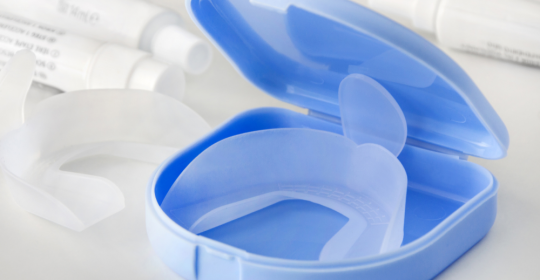
Is Teeth Grinding Damaging Your Smile? Find Out If You Need a Nightguard
Grinding and clenching your teeth while you’re asleep is common among adults and children. When it starts to cause headaches, tooth or jaw pain, or damage your teeth, it’s time to talk to your dentist about bruxism. A common treatment for teeth grinding (bruxism) is a nightguard.
You might have noticed you wake up and immediately have a headache. Or, you have noticed that your jaw is a little sore, your tooth has become chipped or out of place. Our team at Karalee Family Dental are trained to look for signs of bruxism and help you with your next steps.
We may recommend a mouthguard to wear at night, it’s an easy way to protect your teeth from the damage caused by grinding. Nightguards act as a protective barrier when your teeth are grinding or from the force of clenching, and so it prevents the teeth from any further damage.
What is sleep Bruxism?
If you frequently wake up with a headache, tooth, or jaw pain, you may want to ask your dentist if you have bruxism.
Common Signs of Sleep Bruxism
- Chipped teeth
- Waking up with headaches
- Temporomandibular Joint Disorder—inflammation of the jaw due to clenching
- Taking antidepressants with paroxetine
- Chronic teeth grinding
Nightguards
There are multiple ways to reduce the impact of bruxism on your overall dental health. One of the most common is a nightguard. Typically worn while sleeping, some nightguards are available without a prescription at most pharmacies. To use it, boil it or microwave it, depending on instructions. Let it cool for a minute, and then gently bite down and mould it to your mouth.
You can also see your dentist for a custom-made nightguard. They will assess your condition and prescribe one that suits your bite and are a lot stronger than over-the-counter nightguards.
Caring for Your Mouthguard
It’s best to put your mouthguard in just before sleeping. You can remove it as soon as you wakeup. Discomfort is common at first, but you should start feeling more comfortable after wearing it for four to six weeks.
You should wash your mouthguard before and after each use. Rinse your mouthguard with clean, cold water or brush it with a toothbrush and toothpaste. Do not leave your mouthguard exposed to heat or wash it with hot water.. Store your mouthguard in a container, if you find it feels loose or no longer fits, it’s probably time to replace it or see your dentist.
If you find a nightguard is uncomfortable, you can discuss other treatment options with your North Ipswich dentist. It’s important to know that bruxism can be treated with your dentist’s help.
Leave a reply →






Most Commented